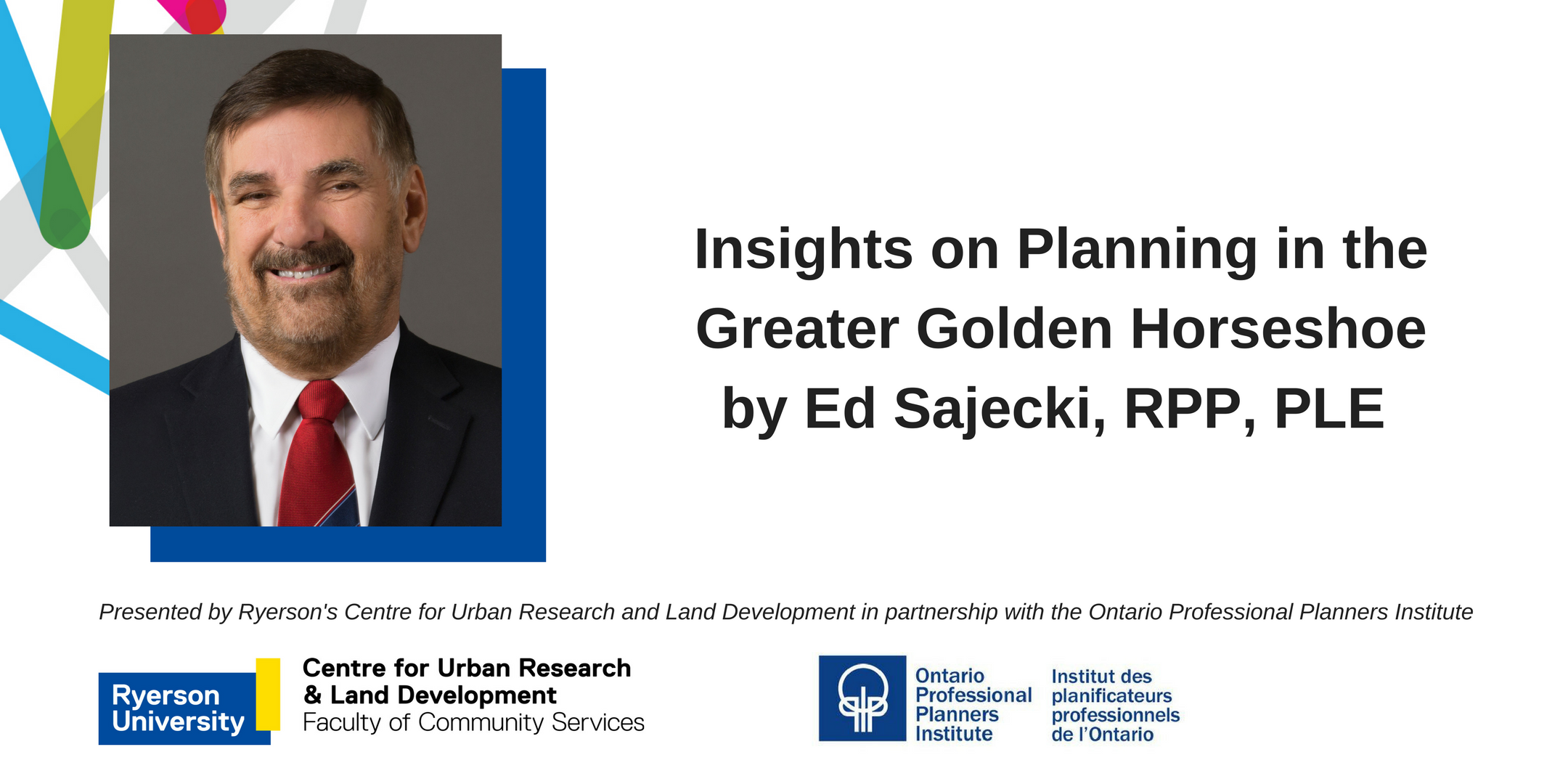News & Events

Insights on Planning in the Greater Golden
Horseshoe by Ed Sajecki
By: Alex Butler
Research Assistant
Centre for Urban Research and Land Development
On January 10th, 2018, Ed Sajecki, Commissioner of Planning and Building at the City of Mississauga, the GTA’s second largest city, shared his insights on land use planning in the Greater Golden Horseshoe (GGH) at a seminar organized by Toronto Metropolitan University’s Centre for Urban Research and Land Development (CUR) in partnership with the Ontario Professional Planners Institute (OPPI). This seminar comes as he retires from a long and accomplished career in Ontario public service at both the municipal and provincial levels. After his presentation, a panel discussed lessons from Mr. Sajecki’s career, as well as the future of land use planning in Ontario.
Mr. Sajecki’s presentation centred around implementing planning policy with his Top 6 List for Moving from Planning to Implementation:
- Aligning and coordinating national-provincial-local actions
- Committing to the plan (using your plan as a decision-making tool)
- Linking planning to budgeting
- Keeping communities engaged (including the private sector)
- Achieving the plan one step at a time (stay the course)
- Just do it!
He emphasized that great cites need good bones, suggesting that as a region-wide plan, the Growth Plan for the Greater Golden Horseshoe, policies are part of the “bones” for the Greater Golden Horseshoe. He said that the Growth Plan and other past provincial policies are contributing to the denser development occurring in Mississauga’s downtown and the mobility hubs in Cooksville, Port Credit and elsewhere.
Mr. Sajecki discussed challenges in the development application process including delays which have financial impacts on landowners, a lack of support for one-off applicants, and applications that have multiple resubmissions. He highlighted Mississauga’s Rapid Review Committee where directors meet weekly to resolve issues in applications. In addition, developers in the city of Mississauga meet with a Development Ambassador who helps guide them through the application process and provides them with possible solutions to any issues which may arise.
Mr. Sajecki referred to a pro forma schema in his presentation to emphasize the importance of getting the business case correct in planning. In addition to revenues, developers consider the project costs (land acquisition, development approvals, site work, interest charges, etc.) to determine project feasibility. Mr. Sajecki stressed project feasibility is something planners should also take into account.
Panelist Allan Leibel, Counsel with Goodmans LLP, praised Ed Sajecki’s recognition of planning as a people issue throughout his career. He said that although the technical aspects of planning are important, people skills are the most important in planning.
Mr. Leibel echoed Mr. Sajecki’s sentiments regarding the importance of the development pro forma, stating that if you plan without regard to pro forma results, you are planning for nothing. Mr. Leibel also spoke about funding issues associated with the growth spurt occurring in the GGH. He said that one of the government’s major sources of funding growth is the imposition of costs onto the development industry through fees, development charges, Section 37 and inclusionary zoning. These costs are in turn passed onto the buyer resulting in the high cost of housing.
Panelist Lindsay Dale-Harris, Partner with Bousfields Inc., attributed Mr. Sajecki’s success to his broad understanding of engineering, planning, and administration, as well as his commitment to the public sector.
Ms. Dale-Harris stressed the importance of striking a balance between the public and private sector in supporting infrastructure. She stated there needs to be more thought given to funding infrastructure under the Growth Plan. Ms. Dale-Harris cited Mississauga as a beneficial of enormous upfront capital outlays for sewer and water infrastructure initially paid for by the Province as a possible model for much needed infrastructure investment today.
The panel discussed a number of current issues including provincial land use planning reform through Bill 139. Mr. Leibel expressed concern with the new bill making appeals to the new OMB much more difficult. Mr. Sajecki suggested that the reforms will force municipal councils to make difficult or unpopular decisions that would have previously gone to the OMB. Ms. Dale-Harris noted that the new legislation makes board decisions more about adherence to provincial policy rather than good planning.
The event was a celebration of Ed Sajecki’s distinguished career in municipal and provincial planning. The insights from his local and international experience led to an interesting discussion centred on the future of urban planning in the Greater Golden Horseshoe. We wish Mr. Sajecki a happy retirement.
(PDF file) Read Ed Sajecki's presentation >>
Watch a video of the event: https://ryecast.ryerson.ca/34/Watch/12119.aspx